- Home
- Catherine Jinks
The Abused Werewolf Rescue Group
The Abused Werewolf Rescue Group Read online
First published in 2010
Copyright © Catherine Jinks 2010
All rights reserved. No part of this book may be reproduced or transmitted in any form or by any means, electronic or mechanical, including photocopying, recording or by any information storage and retrieval system, without prior permission in writing from the publisher. The Australian Copyright Act 1968 (the Act) allows a maximum of one chapter or ten per cent of this book, whichever is the greater, to be photocopied by any educational institution for its educational purposes provided that the educational institution (or body that administers it) has given a remuneration notice to Copyright Agency Limited (CAL) under the Act.
Allen & Unwin
83 Alexander St
Crows Nest NSW 2065
Australia
Phone: (61 2) 8425 0100
Fax: (61 2) 9906 2218
Email: [email protected]
Web: www.allenandunwin.com
Cataloguing-in-Publication details are available from the National Library of Australia
www.librariesaustralia.nla.gov.au
ISBN 9781742373638
Cover and text design by Bruno Herfst
Cover photo by Glue Stock/Shutterstock
Set in 12/15 pt Chaparral Pro by Midland Typesetters, Australia
Printed and bound in Australia by Griffin Press
10 9 8 7 6 5 4 3 2 1
To Thomas and Matthew Jinks
You’ve probably heard of me. I’m the guy they found in a dingo pen at Featherdale Wildlife Park.
It was all over the news. If I’d been found in a playground, or on a beach, or by the side of the road, I wouldn’t have scored much coverage. Maybe I’d have ended up on page five of some local rag. But the whole dingo angle meant that I got national exposure. Hell, I got international exposure. People read about me in all kinds of places, like England and Canada and the United States. I know, because I checked. All I had to do was google ‘dingo pen’ and – pow! There I was.
Not that anyone mentioned my name, of course. Journalists aren’t supposed to identify teenagers. In the Sydney Morning Herald, this is all they said:
A 13-year-old boy is in a stable condition at Mount Druitt Hospital after being found unconscious in a dingo pen at Featherdale Wildlife Park, in Sydney’s west, early this morning. A park spokesman says that a dingo in the same pen sustained minor injuries, which were probably inflicted by another dingo. Police are urging anyone with information about the incident to contact them.
As you can see, it wasn’t exactly a double-page spread. And just as well, too, because when I was found, I was in the buff. Naked. Yes, that’s right: I’d lost my gear. Don’t ask me how – I can’t tell you how. All I know is that I’m the luckiest guy alive. Being Dingo Boy was bad enough, but being naked Dingo Boy would have been much, much worse. I wouldn’t have survived the jokes. Can you imagine the kind of abuse I’d have copped on my first day back at school? It would have been a massacre. That’s why I’m so relieved that nobody printed a word about the missing clothes. Or the damaged fence. Or the cuts and bruises. Either the newspapers weren’t interested, or the police weren’t talking. (Both, probably.) And I never told anyone that I was naked. Not even my best friends. Especially not my best friends.
I mean, I’m not a complete idiot.
So there I was, in the dingo pen at Featherdale Wildlife Park, and I don’t remember a thing about it. Not one thing. I remember lying in my own bed at around 10.00 pm, fiddling with a pen-torch, and then I remember waking up in hospital. That’s all. I swear to God, I wasn’t fiddling with a tube of glue, or a bottle of scotch; it was an ordinary pen-torch. Next thing I knew, I was having a ct scan. I was stretched out on a gurney, with my head in a machine.
No wonder I panicked.
‘It’s all right. You’re all right,’ people were saying. ‘Can you hear me? Toby? Your mum’s on her way.’
I think I might have mumbled something about breakfast, then, as I tried to pull off my pulse oximeter. I was a bit confused. I was, in fact, semiconscious. That’s what Mum told me afterwards; I was semiconscious with a suspected head injury. When you’re semiconscious, it’s usually because you’ve damaged your head or your spine. In the ambulance, on your way to hospital, you have to wear an oxygen mask and a neck collar. And once you reach the Emergency Department, they start checking you for things like leaking cerebral fluid. (Ugh.)
I wasn’t semiconscious for very long, though. At first I didn’t quite know where I was. I couldn’t understand why I was lying down, or what all the beeping monitors were for. But the fog in my head soon cleared, and I realised that I was in trouble. Big trouble.
Again.
Just six months before, I’d been in the same Emergency Department with two broken fingers, after my friend Fergus and I had taped rollerskates to a surfboard. (I don’t recommend grass-surfing, just in case you’re interested; it’s impossible to stand up.) So I recognised the swinging doors, and the funny smell, and the bed-curtains. Even a couple of the faces around me were vaguely familiar.
‘What happened?’ I asked, as I was being wheeled around like a shopping trolley full of beer cans. ‘Did I get hurt?’
There was a doctor looming over me. I could see straight up her nose. ‘Don’t you remember?’ she said.
‘Nuh.’
‘What’s the last thing you can remember?’
‘Um . . .’ I tried to think, but it wasn’t easy. Not while I was being poked and prodded by about a dozen different people.
‘Do you have a headache?’ someone inquired.
‘No.’
‘Do you feel sick in the stomach?’
‘A bit.’
‘Can you look over here, please, Toby? It is Toby, isn’t it?’
‘Yeah. Course.’ At the time, I thought that they knew me from my previous visit. I was wrong, though. They were only calling me Toby because Mum had panicked. She’d walked into my bedroom at 6.00 am, seen my empty bed, searched the house, realised that I didn’t have my phone, and notified the police. I don’t suppose they were very concerned at that point. (It wasn’t as if I was five years old.) All the same, they’d asked for a name and description.
So when I showed up at Featherdale, without any id, it didn’t really matter. The police were already on the lookout for a very tall, very skinny thirteen-year-old with brown hair, brown eyes and big feet.
One of the nurses told me later that she didn’t recognise me when I first came in because there was so much blood and dirt all over my face.
‘Can you tell us your full name, Toby?’ was the next question pitched at me, from somewhere off to my right.
‘Uh – Tobias Richard Vandevelde.’
‘And your address?’
I told them that, too. Then I spotted the big, jagged cut on my leg.
‘What happened?’ I said, with mounting alarm. ‘Is Mum all right?’
‘Your mum’s fine. She’s on her way here now. The police called her.’
‘The police?’ This was bad news. This was terrible news. ‘Why? What have I done?’
‘Nothing. As far as we know.’
‘Then—’
‘You’re breathing a bit fast, Toby, so what I’m going to do now is run a blood gas test . . .’
I couldn’t get a straight answer from any of them, but I didn’t want to kick up a fuss. Not while they were trying to figure out what was wrong with me. They kept asking if I was in pain, and if I could see properly, and if I knew what year it was, and then at last the crowd around my bed began to disperse. It didn’t take me long to realise that people were drifting away because I wasn’t going to die. I mean, I’d obviously been downgraded fr
om someone who might spring a leak or pitch a fit at any moment to someone who could be safely left in a holding bay, with a couple of machines and a really young doctor.
‘Not all of these cuts are going to heal by themselves,’ the really young doctor said cheerfully, as he pulled out his box of catgut (or whatever it was). ‘We might give you a local before we stitch you up. Do you know when you had your last tetanus shot?’
Dumb question. Of course I didn’t. You’d be better off asking me how many eyelashes I have.
‘No.’
‘Fair enough.’ He didn’t seem too surprised. ‘Maybe your mum can tell me.’
‘Maybe I can tell you what?’ said a voice – and all of a sudden, there was my mum. She’d obviously had a bad morning. Though she was dressed in her work clothes, with earrings and fancy shoes and her good handbag, she hadn’t put on her make-up or her contact lenses. And without make-up or contact lenses she looks like . . . well, she looks like a nun or something. It’s partly because she’s so pale and tired and washed-out, and partly because she wears big, chunky, librarian-style glasses.
‘I’m Rowena Vandevelde,’ she said. ‘Is there something you wanted to ask me?’
‘Oh. Ah. Yes.’ The very young doctor forgot to introduce himself. ‘I was wondering when Toby last had a tetanus shot . . .’
Mum knew the answer to that, of course. She also knew my Medicare number, and the exact date of my last hospital visit, and all the other boring details that I couldn’t have remembered in a million years. Because she’s a mother, right? It’s her job to keep track of that stuff.
I kind of tuned out while she was debriefing various people with clipboards. I might even have dozed off for a few minutes, because I was really tired. But I woke up again quick smart when the very young doctor started jabbing needles into me. That was no fun, I can tell you. And it seemed to last forever, even though Mum tried to distract me with her questions.
The first thing she wanted to know was: what happened?
‘You tell me,’ was all I could say.
‘Don’t you remember?’
‘Nope.’
‘Nothing at all?’
I shook my head, then winced. ‘Ouch,’ I complained. And the very young doctor said, ‘Nearly finished.’
‘What’s the last thing you do remember?’ Mum queried. ‘Do you remember leaving the house?’
‘No.’ A sort of chill ran through me. ‘Is that what I did?’
‘You weren’t in bed this morning.’ Mum’s voice wobbled a bit, but she managed to hold it together. ‘They found you at Featherdale.’
‘Featherdale?’
‘In the dingo pen.’
I’d better explain that I live quite close to Featherdale Wildlife Park, so I’ve been there a few times. And I’ve seen the dingo pen.
‘Oh, man,’ I croaked. It was hard to believe. But one look at Mum’s face told me that she wasn’t kidding.
‘Are you sure you don’t know how you got there, Toby?’
‘Nup.’
‘Do you remember going to bed?’
Casting my mind back, I could recall throwing off my doona because it was so hot. I’d picked up my pen-torch and shone it at the stickers on the ceiling. The fan had been whirling round and round overhead.
Could it have hypnotised me, somehow?
‘You weren’t very well,’ Mum continued. ‘That’s why you went to bed earlier than usual.’
‘Yeah.’ It was true. I’d been feeling seedy, though not in any specific way. I hadn’t been suffering from a headache or a sore throat or a nagging cough. I’d just felt bad. ‘My stomach’s still bothering me.’
‘Dr Passlow will be here soon,’ the very young doctor remarked. ‘He’s the paediatrician. You can discuss those symptoms with him.’ Then he patted my wrist. ‘All finished. Well done. You’re a real hero.’
As he packed up his catgut and his bits of bloodstained gauze, I tried and tried to recollect what had happened. I’m a light sleeper, so there’s no way I could have been dragged out of bed and carried off like a baby. If I’d left the house, I would have done it under my own steam.
But why? And how?
‘You must have crawled out the window,’ Mum volunteered, as if reading my mind. ‘All the geraniums underneath it were trampled.’
‘Oh,’ I said. ‘Sorry.’ Though I didn’t even know what geraniums were, I figured they must have been important. Not to mention fragile. ‘I don’t remember that.’
‘Listen, Toby.’ Mum leaned forward. She looked like a total wreck – what with her twitching nerves and puffy, bloodshot eyes – but her voice was still sweet and calm. Even when she’s mad at me, she doesn’t sound as if she’s yelling or nagging. I guess it’s because she’s a speech therapist.
Maybe she’s spent so many years teaching people to talk nicely that she can’t stop doing it herself.
‘If there’s something you don’t want to tell me,’ she said, ‘you can always talk to a professional. A counsellor. I know how easy it is to buy drugs these days—’
‘Mum!’
‘—and if you were experimenting—’
‘I wasn’t.’
‘—that would certainly explain what happened.’
‘I wasn’t, Mum!’
‘Are you sure?’ She stared at me long and hard. ‘Think about it. Are you absolutely sure?’
I couldn’t be sure. That was the trouble. I couldn’t remember anything, so I couldn’t be sure of anything. Except, of course, that I don’t usually mess around with drugs. The only cigarette I’ve ever smoked made me really, really sick; I smoked it at school, during recess, and when the bell went for class I was too cheap to throw it away because it was only half-finished. So I quickly smoked the rest – in about ten seconds flat.
Man, but that was a bad idea. I nearly passed out. I thought I was going to die. (From nicotine poisoning?) Practically the same thing happened at Amin’s house, when we discovered an ancient bottle of port in his garage. We tried to drink the whole lot before his dad came home, and I was puking for hours afterwards.
That was when I decided there are better ways to have fun – like grass-surfing, for instance. I might have broken a few fingers doing it, but at least I had fun. Sculling port, on the other hand, isn’t fun. That stuff tastes like cough syrup. As for smoking cigarettes . . . well, I’d rather make sticky-bombs any day.
‘I couldn’t have been stoned.’ Upon mulling things over, I was convinced of this. ‘I don’t have any drugs. Not even glue or smelly marking pens.’ The thing about drugs is, they’re expensive. Fergus has a brother called Liam who smokes a lot of marijuana, and he never lets Fergus sample his stash because it costs so much. It’s kept under lock and key, too; there’s no way Fergus could have got to it. And since I can’t afford an iPhone, I’m certainly not going to be shelling out huge amounts of dosh for a few puffs of hydroponic. ‘There were no drugs in my bedroom, swear to God.’
‘But could you have gone out to get some, Toby?’
‘No!’ By this time, I have to admit, I was starting to panic. It’s no joke when a whole chunk of your life has suddenly gone missing. ‘Why would I have done that?’
Mum sighed. ‘Because Fergus asked you to?’ she suggested.
I suppose I’d better explain that Mum doesn’t like Fergus very much. She doesn’t mind my friend Amin, but she thinks Fergus is a bad influence. It’s probably no surprise that she wanted to blame Fergus for what had happened.
To be honest, I couldn’t help wondering about that myself.
‘If you got involved in some prank, Toby, and you’re scared to admit it—’
‘I don’t know.’ That was the frightening thing. I really didn’t know. ‘I can’t remember.’
‘I won’t get mad, I promise. I’d be relieved.’
‘Mum, I told you. I can’t remember!’ I didn’t want to start crying, so I decided to get mad instead. ‘Why don’t you believe me? It’s not my fault I can’t remembe
r!’
‘Okay. All right.’
‘Why wouldn’t I tell you? I mean, I’m in enough trouble as it is; how could it possibly get any worse?’ I’d hardly finished speaking when I was struck by a horrible thought. ‘I didn’t kill any dingoes, did I?’
‘No,’ said Mum. ‘But the fence was damaged.’
‘What fence?’
‘The one at Featherdale.’
‘Oh.’
‘Which doesn’t necessarily mean that you were responsible,’ Mum quickly added, just as somebody pushed back the curtains that were drawn around my bed.
I looked up to see a pair of uniformed police officers flashing tight-lipped, professional smiles at me. One was a short blonde woman who smelled of soap. The other was a tall dark man who smelled like fish and chips.
‘Hello,’ said the man. ‘How are you doing? Mind if we have a quick word?’
I’d better explain why my dad wasn’t at the hospital. Basically, he wasn’t there because he’s dead. I’m not talking about my biological father; my biological father could still be alive, for all I know. But my adoptive father, Ian Vandevelde, died when I was two years old.
That’s why I don’t remember him. That’s also why Mum has to work two jobs every so often. See, my dad was a lawyer, who earned a lot of money. It was his salary that paid for the big house where we lived when I was a baby, over on the northern beaches. But when he died, Mum couldn’t pay the mortgage – because speech therapists don’t earn very much. She had to sell the house, the Volvo and the timeshare unit, just to pay off all our debts.
Now we live in Doonside, without the pool or the sea view or any of the other luxuries that Mum’s always talking about. But we’re doing okay. I guess we’d be doing even better if it wasn’t for my school fees. I keep telling Mum that I’d be just as happy at one of the local schools. (Happier, in fact, since I wouldn’t have to spend so long on the train every day.) My mum, however, has very firm views on education. So unless I get expelled, I’ll be switching schools over her dead body.
Mind you, I nearly was expelled last year. And when it happened, I felt really bad – because no matter how often I told Mum that it was all my fault, she kept on blaming herself. She seemed to think that if my dad had been around, I wouldn’t have dropped a foil wrapper into hydrochloric acid during science class.

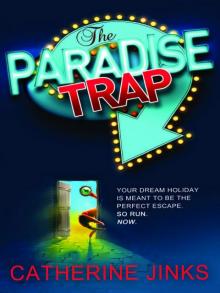 The Paradise Trap
The Paradise Trap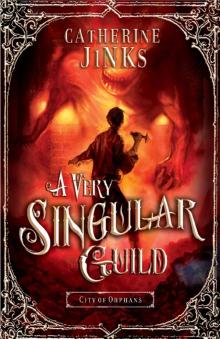 A Very Singular Guild
A Very Singular Guild Eloise
Eloise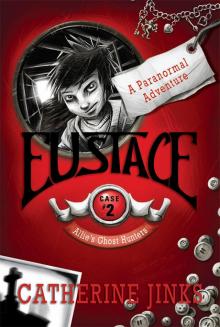 Eustace
Eustace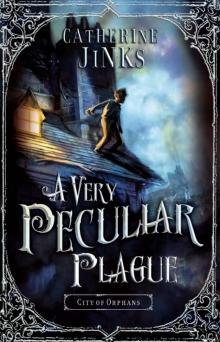 A Very Peculiar Plague
A Very Peculiar Plague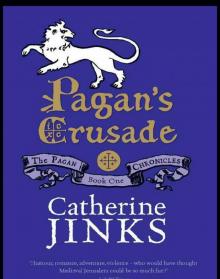 Pagan's Crusade
Pagan's Crusade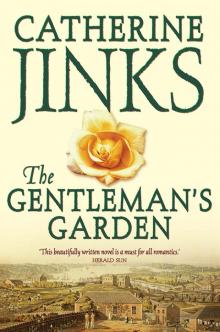 The Gentleman's Garden
The Gentleman's Garden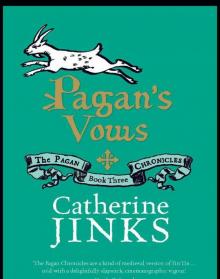 Pagan's Vows
Pagan's Vows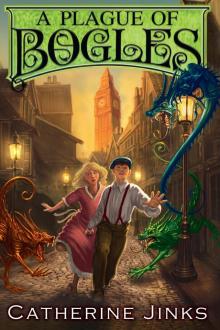 A Plague of Bogles
A Plague of Bogles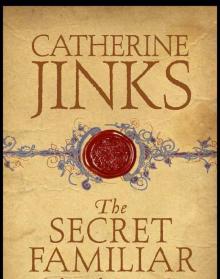 The Secret Familiar
The Secret Familiar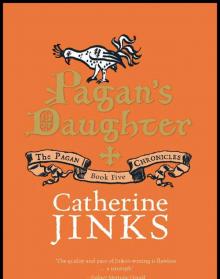 Pagan's Daughter
Pagan's Daughter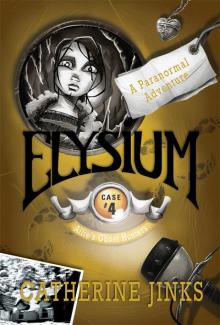 Elysium
Elysium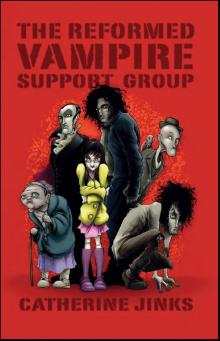 The Reformed Vampire Support Group
The Reformed Vampire Support Group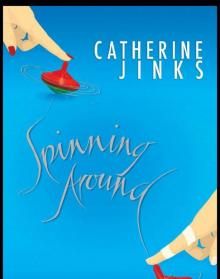 Spinning Around
Spinning Around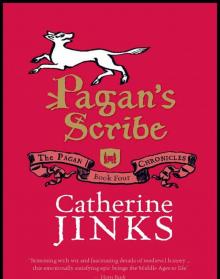 Pagan's Scribe
Pagan's Scribe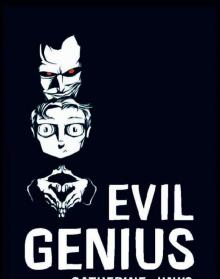 Evil Genius
Evil Genius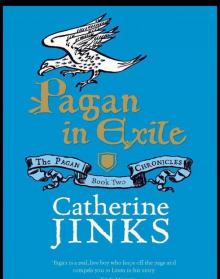 Pagan in Exile
Pagan in Exile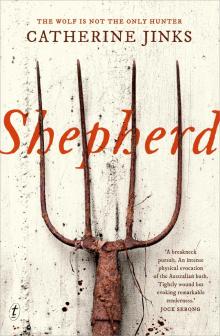 Shepherd
Shepherd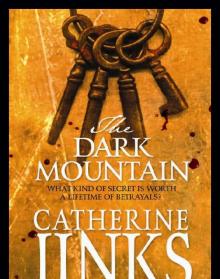 The Dark Mountain
The Dark Mountain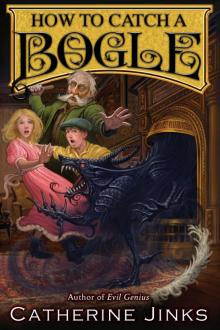 How to Catch a Bogle
How to Catch a Bogle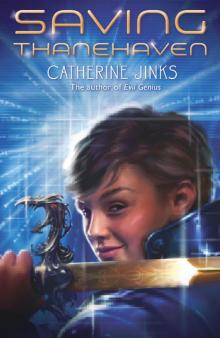 Saving Thanehaven
Saving Thanehaven The Genius Wars
The Genius Wars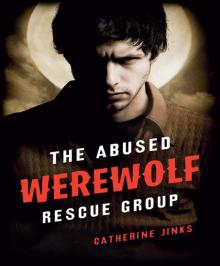 The Abused Werewolf Rescue Group
The Abused Werewolf Rescue Group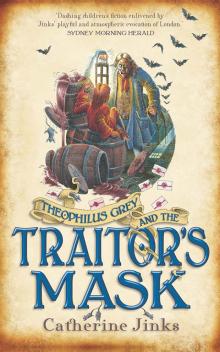 Theophilus Grey and the Traitor's Mask
Theophilus Grey and the Traitor's Mask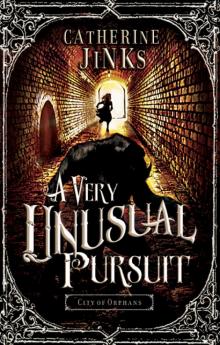 A Very Unusual Pursuit
A Very Unusual Pursuit Genius Squad
Genius Squad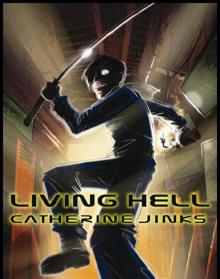 Living Hell
Living Hell The Road
The Road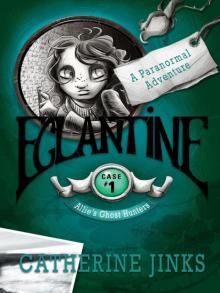 Eglantine
Eglantine